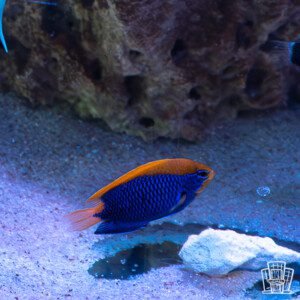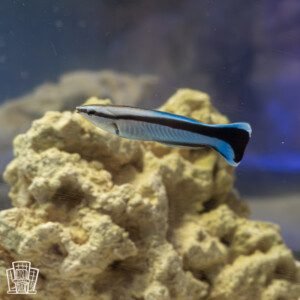Description
- Scientific Name: Heniochus pleurotaenia
- Common Names: Phantom Bannerfish, Indian Ocean Bannerfish, Phantom Butterflyfish
- Maximum Length: 6.7 inches (17 cm)
- Minimum Aquarium Size: 125 gallons (473 liters) for a single fish; larger for pairs or groups. Their active swimming and need for hiding places require ample space.
- Foods and Feeding Habits: Omnivorous, grazing on plankton, small invertebrates, and algae in the wild. In aquariums, offer frozen mysis shrimp, brine shrimp, or flake food with spirulina, supplemented with vegetable-based options and vitamin-enriched foods. Feed small amounts 2-3 times daily.
- Reef Safety: Reef-safe with caution; excellent for controlling aiptasia anemones but may nip at soft corals or large-polyp stony corals. Monitor closely in reef setups.
- Temperament: Peaceful and shy, especially when new; they become more active with time. Can be kept singly, in pairs, or small groups, but introduce similar species together to avoid territorial issues. Pair with non-aggressive tankmates to keep them comfortable.
- Description: The Phantom Bannerfish adds a graceful touch to marine tanks with its elegant form. It features black, white, and yellow stripes, a long white dorsal fin, and small “horns” on the forehead, along with a partial white band between the ventral and anal fins. Native to the Indian Ocean, from the Maldives and Sri Lanka to Java and the Andaman Sea, they inhabit coral-rich lagoons and seaward reefs at depths of 1-25 meters. Their shy nature calls for plenty of hiding spots in live rock, but once settled, they bring lively movement to the aquarium.
Fun Facts:
- Distinguished from similar bannerfish by the light band between its pelvic and anal fins, a subtle but key identifier.
- In the wild, they form large aggregations in places like the Maldives, creating mesmerizing underwater spectacles.
- Often used by aquarists to naturally control pest anemones like aiptasia, acting as a helpful tank cleaner.




